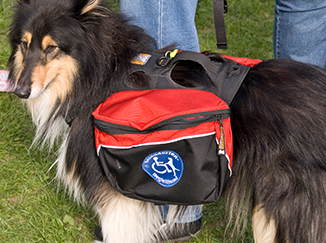Hearing Dogs – Assistance Animals for Your Ears
According to Human Rights Australia, an Assistance Animal (sometimes referred to as a ‘service animal’), can be any animal that has been trained to support a person with a disability to allow them more independence at home and in accessing public facilities.

Dogs are the most familiar form of assistance animals and they fall into the following categories:
- Guide dogs – for people with vision impairment
- Assistance dogs – for people who need assistance with mobility or in performing personal care tasks
- Medical alert dogs – who assist in detecting imminent seizures
- Psychiatric service dogs – assist people with mental health issues such as autism, dementia, acquired brain injury or PTSD (Post Traumatic Stress Disorder)
- Hearing dogs – for people who are Deaf or have a hearing impairment
Assistance dogs are trained to respond only to the commands of their primary carer – who is usually the owner.
What does a Hearing Dog do?
Hearing dogs are trained to assist Deaf and hearing impaired people in a number of ways. They can identify, alert, and direct their carer to over ten different sounds that the hearing impaired person may not detect. Sounds such as fire alarms, door knock or the kettle boiling are all sounds the dogs can be trained to listen for. But their role doesn’t stop there.
Hearing loss can be isolating, and a Hearing dog can provide comfort and security.
At night, when hearing aids are removed, the Hearing dog can add an element of safety for a person with a hearing disability. They also help their carer feel more independent. Having a Hearing dog may encourage its carer to be more confident socially, to be able to connect with family, friends, and community on a more interactive level.
In Australia, Hearing dogs have been provided to the recipients free of charge by Australian Lions Hearing Dogs (ALHD), since 1980. ALHD train the dogs for a six to eight month period and also provide support to the carer once the dog has been placed.
A Hearing dog is not one specific breed and can cost over $37,000 to be trained.
Rights of people with a Hearing dog
Assistance animals, including Hearing dogs must be certified to enable them to have ‘full public access rights’. This entitles the owner to be accompanied by their dog in any public place, including public transport. There are some exceptions to this access – locations or sites where the Assistance animal may be a health risk (food prep areas, quarantine zones or sterile hospital environments).
Air travel with Assistance animals is approved on a case by case basis. Qantas will allow Hearing dogs that have been trained by an Approved Training Organisation however there may be other conditions to be met and should always be identified prior to travel.
For a Deaf or hard of hearing person with a Hearing dog, apart from such situations noted above, it is their right to have access to all public areas. They should not be discriminated against.
If you are interested in finding out more on Hearing dogs, you can contact Australian Lions Hearing Dogs to see if you are eligible for this program. The NDIS provides support and covers costs of Hearing dogs for their recipients.
Need Help Finding Hearing Aids?


